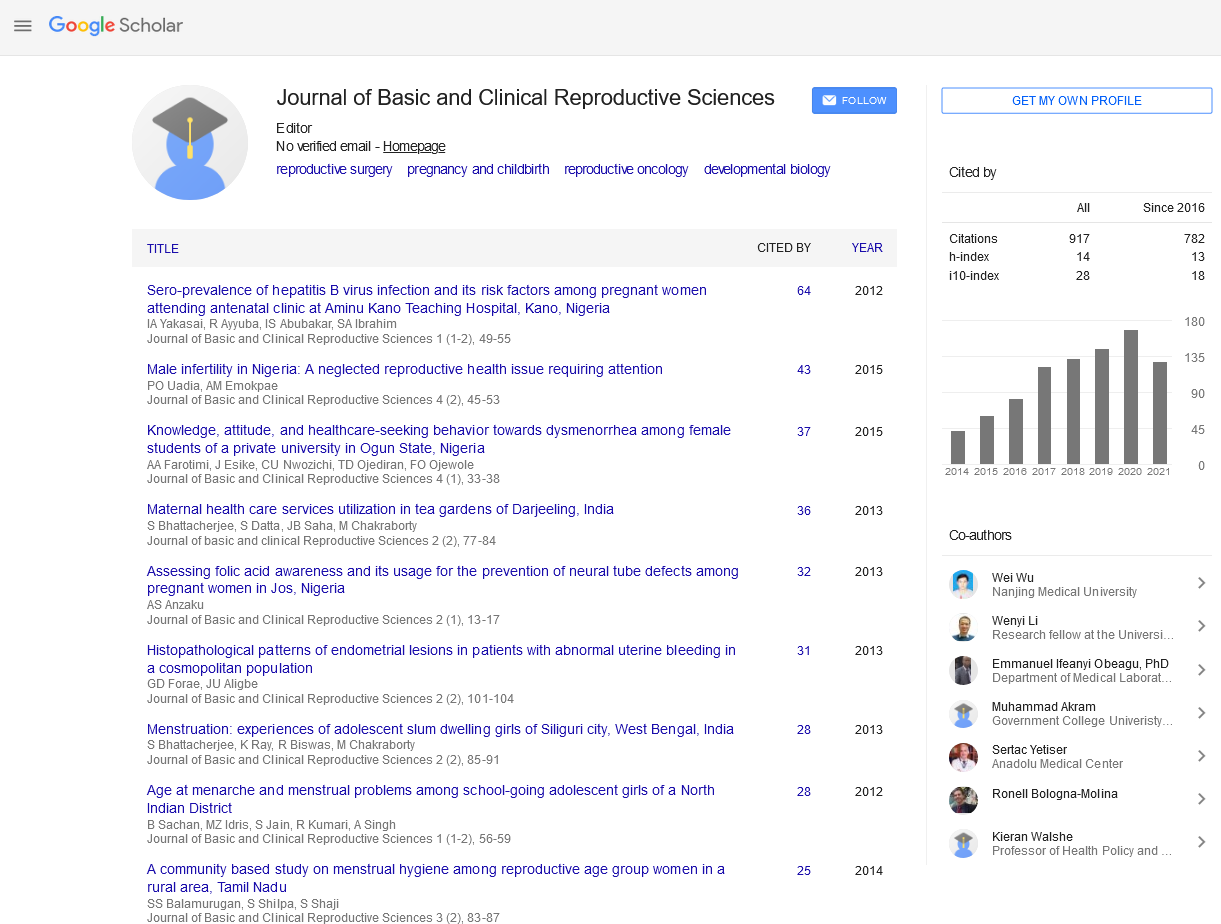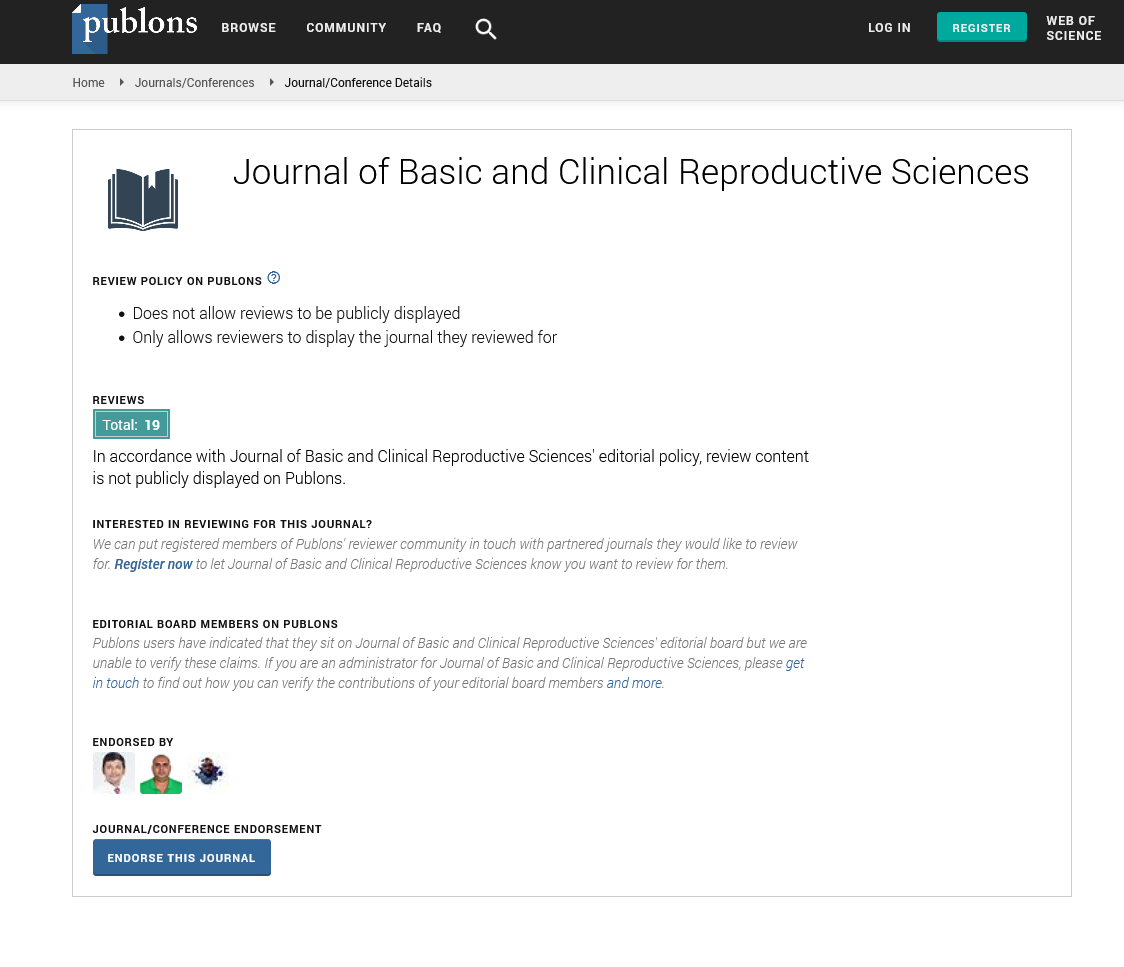Opinion - Journal of Basic and Clinical Reproductive Sciences (2023) Volume 12, Issue 1
Maternal-Foetal Medicine: Current Perspectives and Advances
Received: 10-Jan-2023, Manuscript No. JBCRS-23-96192; Editor assigned: 12-Jan-2023, Pre QC No. JBCRS-23-96192; Accepted Date: Feb 10, 2023 ; Reviewed: 23-Jan-2023 QC No. JBCRS-23-96192; Revised: 03-Feb-2023, Manuscript No. JBCRS-23-96192; Published: 10-Feb-2023
This open-access article is distributed under the terms of the Creative Commons Attribution Non-Commercial License (CC BY-NC) (http://creativecommons.org/licenses/by-nc/4.0/), which permits reuse, distribution and reproduction of the article, provided that the original work is properly cited and the reuse is restricted to noncommercial purposes. For commercial reuse, contact reprints@pulsus.com
Description
Maternal-Foetal Medicine (MFM) is a specialized field of medicine that focuses on the health and well-being of both the pregnant woman and her developing foetus. With advances in medical knowledge and technology, MFM has emerged as a critical discipline to manage high-risk pregnancies and optimize outcomes for both mother and baby. This manuscript provides an overview of the current perspectives and advances in MFM, including prenatal screening and diagnosis, management of maternal and foetal complications, and the role of multidisciplinary care in improving pregnancy outcomes.
Maternal-Foetal Medicine, also known as Perinatology, is a subspecialty of obstetrics that deals with the complex medical and surgical management of high-risk pregnancies. High-risk pregnancies can arise from various factors, such as advanced maternal age, pre-existing medical conditions, genetic abnormalities, multiple pregnancies, and foetal complications. The field of MFM focuses on preventing, diagnosing, and managing complications during pregnancy to optimize the health of both the mother and the foetus. In recent years, there have been significant advancements in the field of MFM, including improved prenatal screening and diagnostic techniques, innovative management strategies, and a multidisciplinary approach to care, all aimed at improving outcomes for pregnant women and their babies.
Prenatal Screening and Diagnosis: One of the key aspects of MFM is prenatal screening and diagnosis, which involves the identification of potential complications in the foetus during pregnancy. Prenatal screening is typically performed during the first and second trimesters and may include tests such as ultrasound, maternal serum screening, and Non-Invasive Prenatal Testing (NIPT). These tests can help identify foetal abnormalities, such as chromosomal disorders like Down syndrome, neural tube defects, and genetic syndromes. Advances in ultrasound technology, including 3D and 4D ultrasound, have improved the accuracy and detail of foetal imaging, allowing for better detection of abnormalities.
In addition to screening, prenatal diagnosis can also be performed using invasive techniques such as chorionic Villus Sampling (CVS) and amniocentesis, which can provide definitive genetic information but carry a small risk of complications. However, the use of these invasive procedures has decreased with the advent of Non-Invasive Prenatal Testing (NIPT) which uses cellfree foetal DNA in the maternal blood to screen for chromosomal abnormalities with high accuracy and low risk.
Management of Maternal and Foetal Complications: MFM plays a crucial role in managing maternal and foetal complications during pregnancy. High-risk pregnancies may be complicated by conditions such as gestational diabetes, hypertensive disorders, preterm labour, placental disorders, and Intrauterine Growth Restriction (IUGR). MFM specialists work closely with other healthcare providers, such as obstetricians, neonatologists, and other specialists, to develop a comprehensive care plan for managing these conditions.
For example, gestational diabetes, which can increase the risk of foetal macrosomia and birth complications, requires careful monitoring of blood sugar levels, diet and lifestyle modifications, and sometimes insulin therapy. Hypertensive disorders during pregnancy, such as preeclampsia, require close monitoring of blood pressure, medications to manage hypertension, and monitoring of foetal well-being. Preterm labour, which can increase the risk of preterm birth and associated complications, may be managed with medications to delay labour, bed rest, and close foetal monitoring. Placental disorders, such as placenta previa and placental abruption, can result in significant maternal and foetal morbidity and may require careful monitoring, blood transfusions, and timely delivery by caesarean section if necessary.


